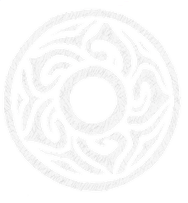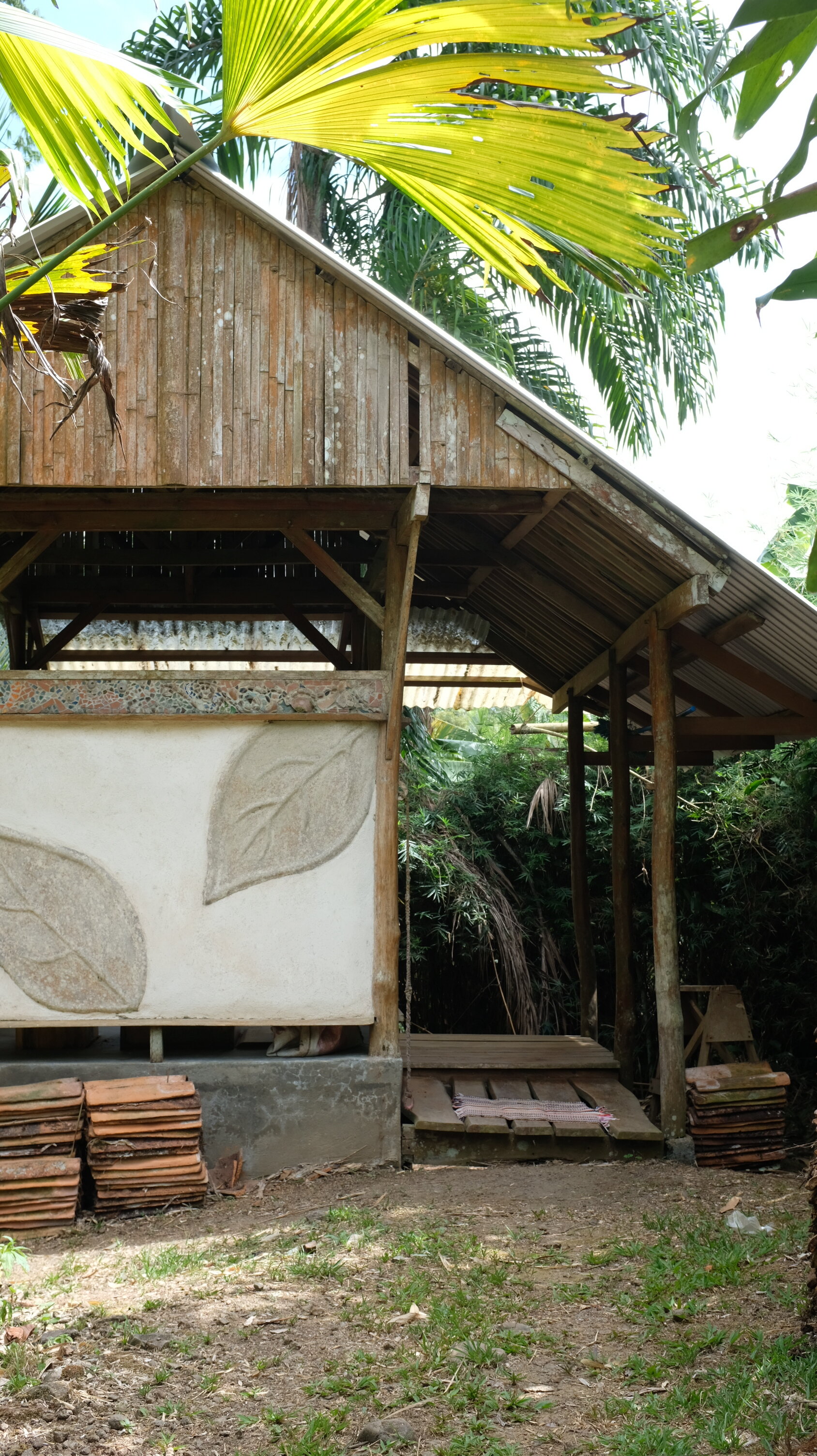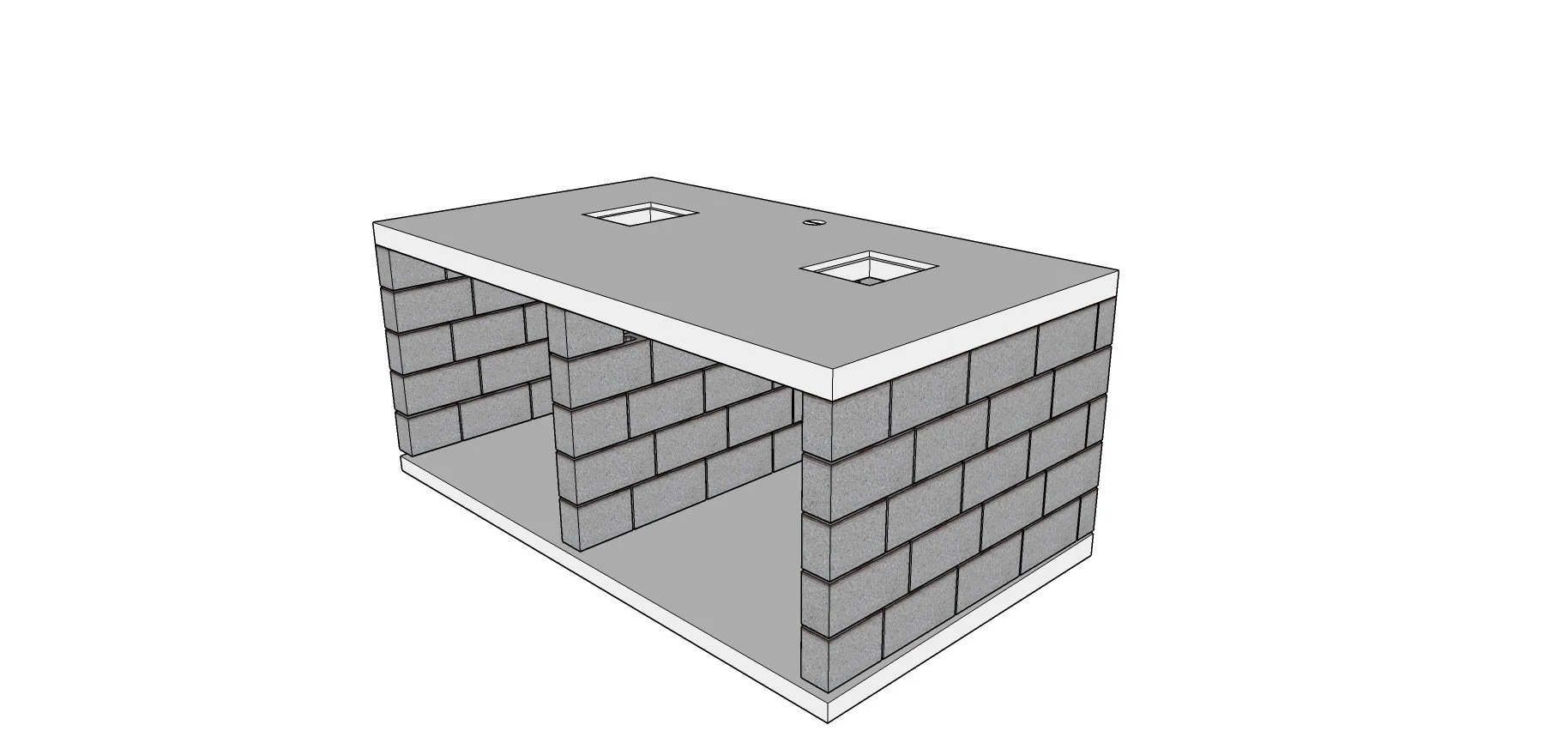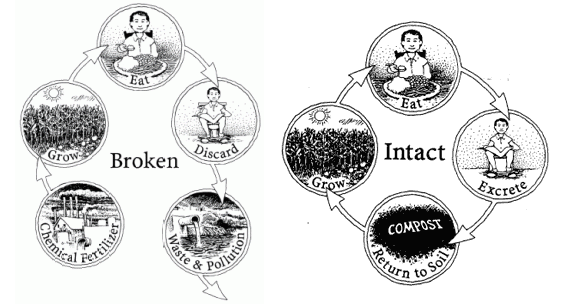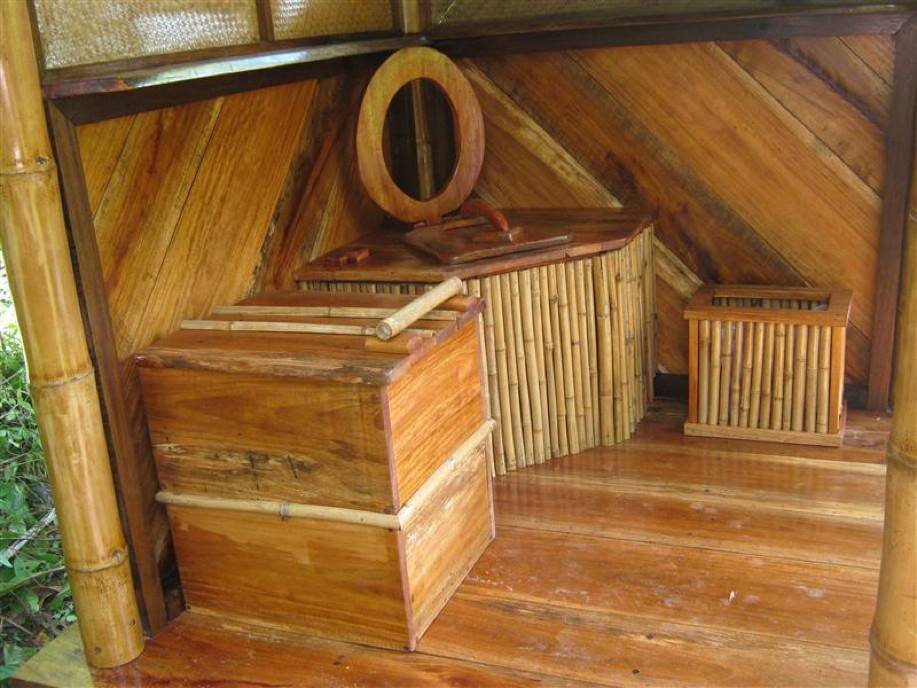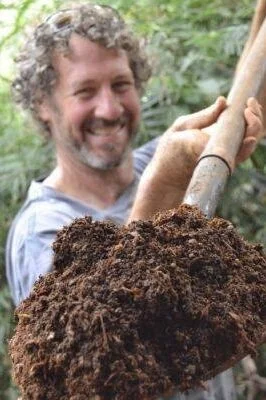Transforming Human-waste into Fertilizer: Compost Toilets
by Moanna , 2020 Apprentice
"Carelessly dumping waste out into the world is a self-centered act of arrogance. Humanure composters can stand under the stars at night gazing at the heavens, and know that, when nature calls, their excretions will not foul the planet. Instead, those excretions are humbly collected, fed to microorganisms, and returned to the Earth as a healing medicine for the soil" -
Joseph Jenkins, author of the Humanure Handbook
Zero Waste?
You likely grew up with flushing toilets, seeing your poop as something to dispose of, but you might also be one of those who agree that humans can only thrive once we live in harmony with nature. The zero-waste movement is in a sense, a yearning to imitate nature where there is no such thing as waste; one organism's excrement is another's food. Compost toilets turn human "waste" (discarded feces and urine) into soil fertility as humanure (food for micro-organisms and fruit trees) - the actual human waste is everything that cannot decompose: cigarette butts, plastic-sixpack rings, deodorant cans, batteries, the five billion gallons of polluted drinking water we flush down our toilets everyday, and the millions of tons of organic material dumped into the natural environment year after year.
Two thirds of the world have no toilet, and don't have a choice, and must live intimately with their shit. Some of us have the opportunity to use it as fuel and fertilizer, instead of turning it into poison. It can feed us, heat us and cure us. There are so many ways to shit properly.
Composting Toilets
Pooping at any of the Rancho's outdoor compost toilets is a pleasing experience; they are made of beautiful natural materials and you are likely to observe all kinds of butterflies or birds. What has nourished your body and instead of being disposed, will feed and sustain millions of other lifeforms. Pooping and urinating becomes a contribution rather than a disposal; instead of waste that gets dumped somewhere, it's a useful resource that gets valued.
From the Humanure Handbook by Joseph Jenkins
The human nutrient cycle goes like this 1) grow food 2) eat it 3) collect and process organic residues (feces, urine, food scraps) 4) return the processed organic matter to the soil, thereby enriching the soil and enabling more food to grow!
Why Composting Toilets?
"If you want to be free, learn to live simply. Use what you have and be content where you are." - Joseph Jenkins, author of the Humanure Handbook
It is not only for those with gardens and fruit trees who should be excited by humanure but all of us who value clean water and air. Compost toilets align with the permaculture ethics of care for Earth and people, and a fair distribution of resources. Here are a few aspects on why and how.
Protect and save water
Each toilet flush launches five to six gallons of polluted water - All life depends on water, and although Earth is mostly water only 3% is without salt and of that 2/3's are locked up in ice - this means that humans pollute the less than 1% of drinking water we have. If a household switches to waterless toilets it would save 40 thousand gallons of water per year. Each flush usually goes somewhere to be "treated", where despite the massive amount of energy and chemical input, pollutants such as nitrates, chlorine, pharmaceutical drugs, industrial chemicals and many more are let out into our living planet, which affects us since we are apart of and one with this living world.
Pumps up resilience
We will be facing all kinds of disruption due to the speed and frequency of natural disasters and their consequences. Flushing toilets rely heavily on well-established infrastructure, and loads of energy, water and chemicals. With the growing number of natural disasters, this system is super vulnerable as storms, floods, and fires can cause disruption many parts of that system. Urban and suburban areas globally are experiencing storm events causing flooding and overflowing the basins in sewage systems. This can go on for days or weeks, and human excrement along with all the other waste that goes down the drains ends up in the streets, and we're back to the middle ages where diseases and pathogens get to have a big party. So if you know how to compost and make humanure, you can stop relying on this fragile and eco-cidic system and help others in the same direction, and when disruption occurs in your surrounding community you can continue to recycle your brown gold!
Compost can degrade toxic chemicals
An Austrian farmer could feed his community with the produce from his fields that were sprayed with compost-type microorganisms, whereas the produce from surrounding farms were banned due to radioactive cesium contamination from the Chernobyl disaster. Micro-organisms in compost are able to digest these toxic compounds because many produce antibiotics. If this excites you, check out Mycilium Running by Paul Stamets.
SCARY FACTS About the current waste system
There is an exceptional degree of agreement within the scientific community that natural systems can no longer absorb the burden of current human practices
The use of antibiotics is so widespread that many people are now breeding antibiotic resistant bacteria in their intestinal systems. These bacteria are excreted into toilets and make their way to wastewater treatment plants where the antibiotic resistance can be transferred to other bacteria, and the water containing and breeding these bacteria is led out into our living planet. The chlorine used to supposedly clean water seems to increase bacterial resistance to some antibiotics. (Waste water microbiology p.86 Humanure Handbook)
Chlorine is used to disinfect much of the world's drinking water and wastewater before its released out to our environment. The most harm comes from the by-products such as chloroform and dioxin, that cause all sorts of awful stuff such as death in snapping turtles, death in lake trout, reproductive problems in otters and minks, and cancer in humans - to name a few.
50-90% of pharmaceutical drugs humans consume end up in waterways - chemotherapy drugs, antibiotics, hormones and much more are found in tap water, lakes, rivers and drinking water aquifers.
Too often waste is being dumped into water bodies, which the treatment plants are not prepared to deal properly with. Sadly governments and private co-operations are too busy to let consumers know - in review of twenty water systems in six states, out 157 drinking water quality violations, the public were notified on time in only 17 of the cases (humanure book pg 112).
Humanure Fun Facts
Human excrement is in many south east asian countries known as "night soil", and was never wasted. Quite the opposite it was a valuable resource! On the island Tainan in Taiwan it was sold on blackmarkets to fertilize fishfarms.
Fecal transplant saves lifes: A dose of healthy poop, with its 35,000 families of bacteria, can replenish the gut's flora and settle it back to normal. With our massive use of antibiotics we wipe out the good bacteria along with the bad. Transplanting a healthy gut flora into a one suffering from Clostridium diificile (which kills 100,000 each year in america and europe) has been shown in studies to heal 91% of patients in certain cases. (Colours magazine, Shit: a survival guide)
Squating while pooping is the most healthy posture, as it straightens the canal to the desirable 132 degrees. In a study it took squatters 51 seconds to move their bowels, while it took 131 seconds for those who sat. (Colours magazine, Shit: a survival guide)
How do Composting Toilets Work?
"Composting is easier to do than to describe, and like lovemaking, magic when you do it well" -
Sim Van der Ryn
Is it safe? Will it eliminate pathogens and diseases? Does it get stinky? Will it attract flies and rats? Is it hard work? All these question will depend on how the system is designed. There are loads of different systems, and ways of composting humanure. You can buy all sorts of commercial composting toilets, and your climate, local regulations and way of living will guide you to the most appropriate way to turn your "waste" into resource. * This also means that the decomposition process depends on and varies according to each system, place and environment. *
Here at Rancho Mastatal we have 11 composting toilets in 2 sizes (large scale capacity and single family capacity). We size these based on their location and projected use. All of them are designed to be passive systems with little to no management or maintenance. The Ranch's compost toilet system is simple; there are two chambers, when one is filled it gets left to decompose, and by the time the second is filled, the first has transformed into brown gold/rich fertilizer!
The ones in the pictures are the large size composting toilets (each chamber about 2m x 1m x 1m), these are used on average over the year by 7-10 people. They have been sized to take about one year for one side of the chambers to fill up, and the decomposition process is also one year, the same amount of time for the other side to get filled up.
Emptying a composted side of humanure into reusable bags to spread on our orchards
The 2 chamber system that we use here
Composting requires 4 neccesities: Oxygen, moisture, appropriate temperature and a balanced diet, which is the right carbon/nitrogen ratio. When these conditions are right bacteria will start to get active and heat up the compost, creating temperatures over 120 degrees fahrenheit. This rapidly kills pathogens, and just like Mother Nature intended, humanure is a treat for the soil.
A cozy seat
When one chamber is filled the toilet-seat is moved on top of the next chamber, the first is left to decompose with a lid on, and in between is a box for sawdust. For each 'contribution' 2-3 scoops of sawdust is applied to balance the carbon/nitrogen ratio (Sawdust is the carbon sucking up all the nitrogen rich human contributions). Before starting a new chamber it is filled with bigger bulky carbon materials, generally a lattice of bamboo or sticks. This helps create an aerobic environment for the composting organisms to do their work and we avoid having an anaerobic environment, which means no air for the good bacteria to do their job resulting in a stinky toilet.
The design of this system is based on the diverse flow of people on the Ranch; when we have all kinds of people in different quantities for many different periods of time that use our compost toilets, the design is simple for low maintenance. All that needs to be managed is to make sure there is sawdust available and adding the finished soil fertilizer around our orchards once a year. Our main food production is in agro-forestry so we feed the humanure to the trees, by using the natural biological filter of the trees nutrient absorption system we get as an extra layer of safety from any potential pathogens or chemicals in the humanure.
The Composting Stages
Stage 1:
Mesophilic bacteria, (100 million - 1 billion per g of compost), eats, reproduce and create heat until it reaches around 44-52*C (111-125*F) which is the transition to
Stage 2:
Thermophilic bacteria thrives in the higher temperatures, takes over and continue to create heat, sometimes reaching up to 70*C . This heating stage can take place over days, weeks or months. As it cools down again we reach
Stage 3:
Where more diverse organisms such as fungi and earthworms moves in, and digest bigger and more coarse material.
Stage 4:
Is the curing/maturing phase, a long and important one. A long curing period (e.g., half a year in the tropics or a whole year in the temperate, after the thermophilic stage) adds a safety net for pathogen destruction. The longer they are subjected to the microbiological competition of the compost pile, the more likely they will die a swift death. All of this is linked to the soil food web.
Humanure is harmless to handle once fully decomposed and aged
Thanks to the bacteria, fungi and bugs, thriving with good moisture, air and a mix of human excrement and sawdust, the poop from 2018 has gone through a curing process through 2019, and last month the 2020 apprentice team could empty out the beautifully smelling and textured humanure.
Before you begin on this journey towards saving water, decreasing the the extraction and pollution of limited clean freshwater, protecting planetary health and enhancing soil fertility, further exploration and information is necessary. Some simple tips would also be to explore the possibilities to phase out flush toilets in your local community and check out what other people in similar situations to you are doing to stop pooping in drinking water. "The Humanure Handbook" is possibly the best and most enjoyable source of information, Joseph Jenkins shares his 20+years of compost toilet experience and knowledge, and the way he writes has made many crack out in laughter.
This simple low-tech composting system has a positive impact on the Earths ecosystems, making us closer to a harmonious relationship with this living planet. It aligns you with permaculture principles such as catching and storing energy, creating zero-waste, obtain a yield, and makes use of the permaculture attitude where "the problem is the solution". We don't need more science or bigger technology or complexity to meet the crazy complicated crisis that we're facing, but some humility and respect for all that is simple; deal with our own excretions, by making humanure that enhance soil fertility!
Legal issues in Costa Rica
Yes! They are Legal!!
In Costa Rica the legal principles guiding black water disposal are based on the possible contamination of fresh water resources. Composting toilets fall into the category of a safe alternative to blackwater disposal as they don't even create the blackwater in the first place as they are dry (use no flush system). In this document published by the ministry of health, you can see in annex 5 (scroll all the way to the bottom) that composting toilets are legally allowed as a viable alternative to a conventional septic system if the stipulations as outlined in the document are met. This is exciting news for people based in Costa Rica and hopefully can act as a catalyst for other places in the world including them in the building and health codes.
Humanure into Food?
Methane from a Biodigestor
Here at The Ranch our compost toilets feeds the soil, and our Bio-D toilet makes gas for cooking breakfast, it is more attractive option for those who are more comfortable with a flushing toilet, and it is another way of turning "waste" into a valuable resource.
Our biodigester
Black soldier flies
They eat everything, create rich fertilizer and both insects and flies can be a rich protein source for chickens!
A beautiful scoop of humanure
One of our outdoor compost toilets
Hope you feel inspired to, if you can, stop contributing to the modern waste cycle and start creating closed loop systems! Don’t know what closed loop systems are? Join us for our annual Permaculture Design Course to learn about the ethics and principles of permaculture design.
We have been using compost toilets here on the farm for 19 years and always had successful turnouts.
Stay tuned for our next blog on our biodigestor.
